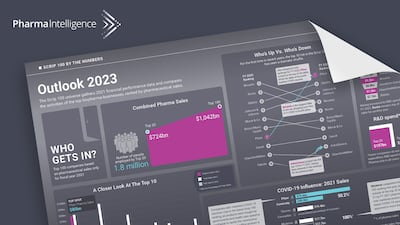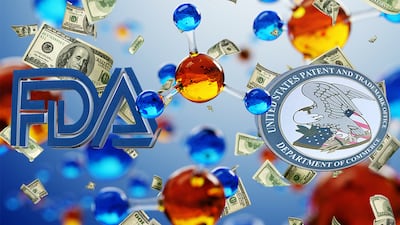Outlook Archive
Abbott Laboratories and Johnson & Johnson joined Medtronic in putting a clear distance between themselves and other global medtechs in the Top 10 by revenues for 2021. Post-COVID-19 procedure growth, and, for Abbott, a strong rebound in non-COVID diagnostic demand, were key drivers.
The Scrip 100 universe gathers FY2021 financial performance data and compares the activities of the top 100 biopharma businesses, ranked by pharma sales.
Pfizer catapulted back into the lead in the pharmaceutical rankings on the strength of COVID-19 revenues while BioNTech and Moderna both made the list for the first time.
What will 2023 bring as the industry faces one of the toughest periods in the last decade? In Vivo asked three industry experts for their views.
The integration of smart connected care, broadening of diagnosis and therapy into new settings and improvement of chronic disease outcomes will continue to shape the market for devices and diagnostics companies for years to come. But there is also a maze of short-term macroeconomic issues for medtechs to work through.
Originally intended to increase medical device safety, the implementation of the EU’s medtech regulation was so hampered in 2022 that it had started to look as if the new regulations were a bigger potential threat to patients than any of the scandals leading to its more stringent requirements. With the European Commission’s latest plans to ease challenges around implementation, will 2023 be a more positive year for the EU medtech sector?
The latest Generics Bulletin Top 50 ranking of global generics and biosimilars companies sees a new name in the top five amid transformations for some of the leading off-patent players. Meanwhile, a number of mid-level firms shift position and newcomers climb into the bottom of the table.
Notable new entrants moved into the Asia 100 this year, with growth catalyzed by COVID-19 vaccines.
For 12 years, bluebird bio has been developing gene therapies for rare genetic disease and now, with two approvals under its belt, the company is continuing to explore uncharted territory as it brings forward innovative new treatments. Holding the map is CEO Andrew Obenshain.
The advent of biosimilar competition to Humira in the US in 2023 represents the largest loss-of-exclusivity opportunity ever for the off-patent industry. But with a host of biosimilar sponsors awaiting launches throughout the year, it remains to be seen how competition will play out.
From new FDA guidance and community engagement efforts to the challenges of precision medicine and decentralization, In Vivo spoke with industry experts about racial and ethnic diversity in the context of clinical trials.
President Biden and Congress are pressuring the agencies to change patent policies so brand manufacturers cannot delay generic and biosimilar competition to keep monopoly prices. Timeline shows how they have responded to these demands.
Improvements in generating, purifying, and delivering RNA material, as well as addressing challenges with degradation by enzymes, have made the RNA class more attractive to drug developers.
When Mads Øvlisen was persuaded by his father-in-law to join the family business, Novo Industri, in 1974 for a short stint in the legal department, little did he know it would the beginning of a lifetime of service to the company that he helped to shape into the diabetes powerhouse it is today.
With only weeks to go in 2022, the three major pharmas each had inked between 16 and 20 deals. Meanwhile, Pfizer has been less busy with 12 deals, but those include M&A totaling $18.2bn.
Pent-up trial demand during 2020 plus trial modernization strategies yields bumper performance in 2021 as research priorities revert to pre-pandemic trends.
Despite major differences in the sponsors, drugs and circumstances, the outcomes from the hearings on Makena’s continued availability and Avastin’s breast cancer indication were strikingly similar, with overwhelming votes in favor of withdrawal. In the process, however, both sponsors gained extra commercial time for their products.
Edwards Lifesciences CEO Mike Mussallem has a unique and long-standing perspective of what the medtech industry should be and do. In over two decades, he has built the structural heart disease and critical care monitoring company into one of the global medtech industry’s most effective innovators.
A typical word cloud for discussions around patient-centered care would feature: business model, digital health, financing, PPP, resources, data sharing, staffing and escalation of costs. But so many other words are missing, which is why patient-centricity risks getting stuck in its current incomplete form. What are medtechs to do?
Big pharma appears to be resetting operations in India fueling some concerns of waning interest. In Vivo looks at what the realignment means or doesn’t.




















